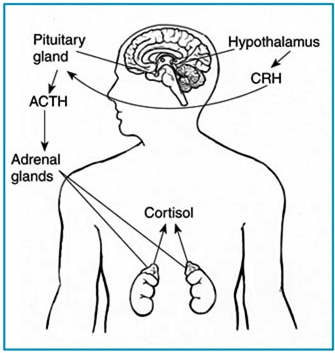How PTSD and High Cortisol Affect Us – Part 2
by Eileen Nauman, DHM (UK)
Copyright 2009 Eileen Nauman
All Rights Reserved
HOW DO YOU GET PTSD?
- It can be a sudden, unexpected trauma or stress. For example, an automobile accident or natural disaster. You can also get PTSD from seeing a catastrophic event, such as a terrorist attack, even if you weren’t actually there. We are all vulnerable to such global trauma. In addition, the loss of a loved one can trigger PTSD.
- A job which causes you to be in the line of fire, such as police officers, EMT workers, firefighters, military personnel in a war zone, can suffer from PTSD.
- Someone who was physically or verbally abused at any point in their life can have underlying PTSD symptoms that they’re not even aware of.
- The psychological and constitutional elements of ourselves, which is known collectively to a homeopath as the “vital force” will create more or less susceptibility to PTSD symptoms. Ten people can view a plane crash. There will be ten different, varying levels of reaction to it. Those whose vital forces are more susceptible to this type of trauma, will be more profoundly affected and they will be the ones coming away with PTSD symptoms and high cortisol levels. Others may be less affected. Four children from abusive households will have four different coping mechanisms and reactions to the environment, and each vital force will respond a little differently to it—but they will all walk away with varying degrees of PTSD. It’s just a question of how much damage has been done and where. Some people’s psyche/vital force, is more resilient than others.
- Any of the above situations combined with physical abuse or bodily injury will cause PTSD. Injury, particularly to the head region, will guarantee it. Homes where children are slapped, beaten, and thrown around, will have a high degree of PTSD symptoms unless they have a very tough, strong vital force. And even then, they will still be wounded; but perhaps not as deeply as some other individuals who are more susceptible to such a combative environment.
- PTSD symptoms can worsen, especially if there is no social fabric in which to seek help or protection from a warlike environment or person. In a sense a PTSD survivor is still in their “prison”—it may not be visible, but it’s there under the guise of high cortisol symptoms.
THE THYROID IMPLICATION
There is synergy between cortisol and thyroid hormones. Both have to be in our cells, bound to their respective receptors at normal levels in order to work efficiently. If cortisol levels are low, because of adrenal exhaustion, our thyroid is less efficient at doing its job of increasing our energy and metabolic activity. The person may end up with hypothyroid symptoms and unwanted weight gain.

When your cortisol is too high, it interferes with the thyroid hormone signal. In essence, it creates what is known as “thyroid resistance”. This means the thyroid hormones levels can be “normal” in a test, but our cell tissues fail to respond as efficiently to the thyroid signal. This too can be misdiagnosed as hypothyroidism. Throwing thyroid supplements at it won’t fix the problem either because the foundation of the problem is high cortisol. You bring the cortisol within normal operation and the hypothyroid symptoms go away, and your thyroid is able to function fully and normally once more.
Signs of hypothyroid symptoms are:
* Fatigue
* Weakness
* Weight gain or increased difficulty losing weight
* Coarse, dry hair
* Dry, rough pale skin
* Hair loss
* Cold intolerance (you can’t tolerate cold temperatures like those around you)
* Muscle cramps and frequent muscle aches
* Constipation
* Depression
* Irritability
* Memory loss
* Abnormal menstrual cycles
* Decreased libido, low or no sex drive
INSULIN RESISTANCE
High cortisol also causes insulin resistance as well. It takes more insulin to drive glucose into the cells when cortisol is high; and so you have high cortisol and insulin, and this creates the “insulin resistance”. You are going to gain weight around the waist because our body stores fat there, rather than burning it off like it should.
PERI-MENOPAUSE AND MENOPAUSE
When cortisol is high, our brain is less sensitive to estrogens. This can throw women into “early” menopause. It can also amp up hot flashes—which are extremely bothersome at night when we’re trying to sleep and in turn we end up with sleep deprivation which can send women into a tailspin over time. In peri-menopausal women, cortisol should drop at night. Progesterone plays an important role here because it actually competes with cortisol for the glucocorticoid receptors. It can counter the stimulating (wide awake vs. sleeping) effects of cortisol at night when you need to be sleeping deeply and soundly. With high cortisol, the progesterone is shoved aside and loses out. The result is insomnia for a woman.
You have post-menopausal women with reasonable amounts of estrogen but when the cortisol rises, they will get hot flashes—which are seen by the medical establishment as an estrogen deficiency. In this case, it’s not a deficiency. It’s the cortisol interfering in the process. If the cortisol levels are brought down to normal, the hot flashes end once and for all. And if your doctor misdiagnoses your hot flash symptoms, you will be prescribed other hormones to compensate—and they won’t work. Be sure, if you are past menopause, and continue to have hot flashes, to get your cortisol levels checked first before taking any other hormones.
BONE LOSS
There are real problems with bone loss (spinal shrinkage among them) when cortisol is high. It activates many of the biochemical pathways that are involved with bone resorption. It specifically inhibits osteoblast activity which is responsible for bone building. It suppresses the production of androgens (male hormones) in the gonads and androgens help build bone in men. It activates osteoclasts which causes bone to be reabsorbed faster than normal. It decreases mineral absorption in the gut (and that is why a good mineral supplement is vital). You won’t be able to absorb calcium and magnesium—both of which are needed to build bone mass and keep the bones strong. It also increases kidney spilling of calcium—another avenue for loss of vital calcium.
REFERENCES:
Schmookler, E., Ph.D., Trauma Treatment Manual, 1996, Revised 2001, http://www.trauma-pages.com/s/schmookler-manual.php
Diagnostic and Statistical Manual of Mental Disorders, 4th edition, American Psychiatric Assn., Washington, D.C., January 1995
The Merck Manual of Diagnosis and Therapy, 16th Edition, edited by Robert Berkow, MD, Merck Research Labs, Rahway, NJ, 1992.
Butler, K., The Biology of Fear, July/Aug. 1996, The Family Therapy Networker, Washington, D.C.
Hypothyroid symptoms
http://www.endocrineweb.com/hypo1.html
High Cortisol, Thyroid, Bones, Menopause
HOW CORTISOL LEVELS AFFECT THYROID FUNCTION AND AGING
Interview with David Zava, Ph.D.
http://www.virginiahopkinstestkits.com/cortisolzava.html

